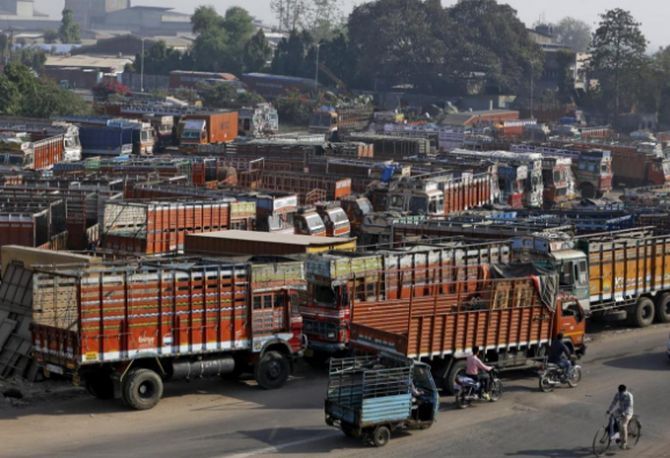Transporters and other stakeholders said the vehicles that will be de-registered would mostly be the ones plying in smaller towns and interior parts of the country.

The proposal to cap life of commercial vehicles -- primarily trucks and goods carrying light commercial vehicles -- at 20 years from 2020 will affect primarily the interior areas of the country.
Many cities, including New Delhi, do not even allow such old vehicles to operate within city limits.
As decided by a ministerial group on Friday, all commercial vehicles registered before 2000 will be de-registered when the policy comes into effect from 2020.
For de-registered vehicles, the owners may get the value of scrap, a goods and services tax (GST) rebate and a discount from automobile makers on purchase of a new vehicle.
Since details of these sops have not yet been finalised, manufacturers such as Tata Motors and Volvo Eicher Commercial Vehicles declined to comment.
All along it was anticipated that the cap would be 15 years, which could have significantly pushed up demand for commercial vehicles.
Transporters and other stakeholders said the vehicles that will be de-registered would mostly be the ones plying in smaller towns and interior parts of the country.
Bal Malkit Singh, owner of Mumbai-based Bal Roadlines, which has a fleet of over 400 trucks, said the vehicle makers will get a push from the decision after 2020 but its scale would depend on the benefits extended to owners of scrapped vehicles.
Singh said truck fleet operators usually sell their vehicles to second-hand buyers after using them for 8-10 years.
“With 20 years being set as the life of trucks, their second-hand prices will also improve. A small operator can by our 10-year-old vehicle and still run them for a decade without any hassles. They may not find it attractive to invest in a new vehicle, which may result in an interest burden,” he said.
Some estimates put the number of vehicles that will be de-registered at 700,000. About 9.4 million commercial vehicles (small and big) are said to be running on Indian roads.
From 2020, thousands of vehicles will be heading to shredding plants every year.
S P Singh, senior fellow at Indian Foundation of Transport Research and Training, said pre-2000 vehicles operating in interior of states in remote or sparsely-populated districts could be about 300,000-400,000.
“Already 75,000-100,000 trucks get voluntarily scrapped every year and they end up at the junk market without getting reported to the regional transport offices,” he said.
Singh said it was a fact that such vehicle owners operating in rural hinterland do not buy new vehicles due to short-haul and low-asset utilisation.
According to Singh, it is interesting that the year of introduction for this policy is 2020 and not 2019. He believes since Lok Sabha elections are due, any impact on rural truck owners due to de-registration of their local operating trucks can impact the voting pattern.
“The Prime Minister’s Office should revisit the scrappage policy in interest of small truck operators located in interior of the country,” he added.
Photograph: Amit Dave/Reuters.












 © 2025
© 2025